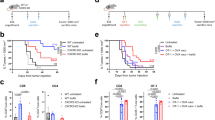Abstract
Lymphomas express a tumor-specific antigen which can be targeted by cancer vaccination. We evaluated the ability of a new idiotype protein vaccine formulation to eradicate residual t(14;18)+ lymphoma cells in 20 patients in a homogeneous, chemotherapy-induced first clinical complete remission. All 11 patients with detectable translocations in their primary tumors had cells from the malignant clone detectable in their blood by PCR both at diagnosis and after chemotherapy, despite being in complete remission. However, 8 of 11 patients converted to lacking cells in their blood from the malignant clone detectable by PCR after vaccination and sustained their molecular remissions. Tumor-specific cytotoxic CD8+ and CD4+ T cells were uniformly found (19 of 20 patients), whereas antibodies were detected, but apparently were not required for molecular remission. Vaccination was thus associated with clearance of residual tumor cells from blood and long-term disease-free survival. The demonstration of molecular remissions, analysis of cytotoxic T lymphocytes against autologous tumor targets, and addition of granulocyte–monocyte colony-stimulating factor to the vaccine formulation provide principles relevant to the design of future clinical trials of other cancer vaccines administered in a minimal residual disease setting.
This is a preview of subscription content, access via your institution
Access options
Subscribe to this journal
Receive 12 print issues and online access
$209.00 per year
only $17.42 per issue
Buy this article
- Purchase on Springer Link
- Instant access to full article PDF
Prices may be subject to local taxes which are calculated during checkout




Similar content being viewed by others
References
Stevenson, G.T. & Stevenson, F.K. Antibody to molecularly-defined antigen confined to a tumor cell surface. Nature 254, 714–716 ( 1975).
Lynch, R.G. et al. Myeloma proteins as tumor-specific transplantation antigens. Proc. Natl. Acad. Sci. USA 69, 1540– 1544 (1972).
Kwak, L.W. et al. Induction of immune responses in patients with B-cell lymphoma against the surface-immunoglobulin idiotype expressed by their tumors. N. Engl. J. Med. 327, 1209–1215 (1992).
Hsu, F.J. et al. Tumor-specific idiotype vaccines in the treatment of patients with B-Cell lymphoma–Long term results of a clinical trial. Blood 89, 3129–3135 ( 1997).
Greenberg, P.D. Adoptive T-cell therapy of tumors: mechanisms operative in the recognition and elimination of tumor cells. Adv. Immunol. 49, 281–355 (1991).
Shu, S., Chou T. & Rosenberg, S.A. Generation from tumor-bearing mice of lymphocytes with in vivo therapeutic efficacy. J. Immunol. 139, 295–304 (1987).
Kwak, L.W., Young, H.A., Pennington, R.W. & Weeks, S.D. Vaccination with syngeneic, lymphoma-derived immunoglobulin idiotype combined with granulocyte-macrophage colony-stimulating factor primes mice for a protective T-cell response. Proc. Natl. Acad. Sci. USA 93, 10972–10977 (1996).
Dranoff, G. et al. Vaccination with irradiated tumor cells engineered to secrete murine granulocyte-macrophage colony-stimulating stimulates potent, specific, and long-lasting anti-tumor immunity. Proc. Natl. Acad. Sci. USA 90, 3539–3543 ( 1993).
Lee, M.S. et al. Detection of minimal residual disease carrying the t(14;18) by DNA sequence amplification. Science 237, 175–178 (1987).
Gribben, J.G. et al. All advanced stage non-Hodgkin's lymphomas with a polymerase chain reaction amplifiable breakpoint of bcl-2 have residual cells containing the bcl-2 rearrangement at evaluation and after treatment. Blood 78, 3275–3280 ( 1991).
Cortopassi, G.A. & Arnheim, N. Using the polymerase chain reaction to estimate mutation frequencies and rates in human cells. Mutat. Res. 277, 239–249 (1992).
Rosenberg, S.A. et al. Immunologic and therapeutic evaluation of a synthetic peptide vaccine for the treatment of patients with metastatic melanoma. Nature Med. 3, 321–327 ( 1998).
Correale, P. et al. In vitro generation of human cytotoxic T lymphocytes specific for peptides derived from prostate-specific antigen. J. Natl. Cancer Inst. 89, 293–300 (1997).
Mandruzzato, S., Brasseur, F., Andry, G., Boon, T. & van der Bruggen, P. A. CASP-8 mutation recognized by cytolytic T lymphocytes on a human head and neck carcinoma. J. Exp. Med. 186 , 785–793 (1997).
Kato, K., Cantwell, M.J., Sharma, S. & Kipps, T.J. Gene transfer of CD40-ligand induces autologous immune recognition of chronic lymphocytic leukemia B cells. J. Clin. Invest. 101, 1133–1141 (1998).
Nair, S.K. et al. Induction of primary carcinoembryonic antigen (CEA)-specific cytotoxic T lymphocytes in vitro using human dendritic cells transfected with RNA. Nature Biotechnol. 16, 364– 369 (1998).
Brossart, P. et al. Her-2/neu-derived peptides are tumor-associated antigens expressed by human renal cell and colon carcinoma lines and are recognized by in vitro induced specific cytotoxic T lymphocytes. Cancer. Res. 58, 732–736 (1998).
Kim, H.T. et al. γδ T cell recognition of tumor Ig peptide. J. Immunol. 154, 1614–1623 (1995).
Hsu, F.J. et al. Vaccination of patients with B-cell lymphoma using autologous antigen-pulsed dendritic cells. Nature Med. 2, 52–58 (1996).
Kwak, L.W. et al. Transfer of myeloma idiotype-specific immunity from an actively immunized marrow donor. Lancet 345, 1016 –1020 (1995).
Osterborg, A. et al. Idiotype immunization combined with granulocyte-macrophage colony-stimulating factor in myeloma patients induced type I, major histocompatibility complex-restricted CD8- and CD4-specific T-cell response. Blood 91, 2459–2466 ( 1998).
Raffeld, M., Neckers, L., Longo, D.L. & Cossman, J. Spontaneous alteration of idiotype in a monoclonal B-cell lymphoma. Escape from detection by an anti-idiotype. N. Engl. J. Med. 312, 1653– 1658 (1985).
Meeker, T. et al. Emergence of idiotype variants during treatment with anti-idiotype antibodies. N. Engl. J. Med. 312, 1658– 1665 (1985).
Lopez-Guillermo, A. et al. The clinical significance of molecular response in indolent follicular lymphomas. Blood 91, 2955– 2960 (1998).
Grabbe, S., Beissert, S., Schwarz, T. & Granstein, R.D. Dendritic cells as initiators of tumor immune responses: a possible strategy for tumor immunotherapy? Immunol. Today 16, 117–120 (1995).
Nelson, E.L. et al. Tumor-specific, cytotoxic T-lymphocyte response after idiotype vaccination for B-cell, non-Hodgkin's lymphoma. Blood 88, 580–589 (1996).
Fisher, R.I. et al. Diffuse aggressive lymphomas: increased survival after alternating flexible sequences of ProMACE and MOPP chemotherapy. Ann. Intern. Med. 98, 304–309 ( 1983).
Kobrin, C.B. & Kwak, L.W. Development of vaccine strategies for the treatment of B-cell malignancies. Cancer Invest. 15, 577–587 (1997).
Schultze, J.S. et al. Follicular lymphomas can be induced to present alloantigen efficiently: a conceptual model to improve their tumor immunogenicity. Proc. Natl. Acad. Sci. USA 92, 8200– 8204 (1995).
Schultze, J.S., Seamon, M.J., Michalak, S., Gribben, J.G. & Nadler, L.M. Autologous tumor infiltrating T cells cytotoxic for follicular lymphoma cells can be expanded in vitro . Blood 89, 3806–3816 (1997).
Wiltrout, R.H., Taramelli, D. & Holden, H.T. Measurement of macrophage-mediated cytotoxicity against adherent and non-adherent target cells by release of 111Indium-oxine. J. Immunol. Meth. 43, 319– 331 (1981).
Acknowledgements
We thank the physicians and nursing staff of the former Biological Response Modifiers Program and the pharmacy and nursing staff of the 13E unit in building 10, NIH Clinical Center, for their patient care. We also thank S. Grove, J. Mikovits and C. Petrow for technical assistance and D. D. Taub for scientific discussions.
Author information
Authors and Affiliations
Corresponding author
Rights and permissions
About this article
Cite this article
Bendandi, M., Gocke, C., Kobrin, C. et al. Complete molecular remissions induced by patient-specific vaccination plus granulocyte–monocyte colony-stimulating factor against lymphoma . Nat Med 5, 1171–1177 (1999). https://doi.org/10.1038/13928
Received:
Accepted:
Issue Date:
DOI: https://doi.org/10.1038/13928
This article is cited by
-
Cancer vaccines: the next immunotherapy frontier
Nature Cancer (2022)
-
GM-CSF elicits antibodies to tumor-associated proteins when used as a prostate cancer vaccine adjuvant
Cancer Immunology, Immunotherapy (2022)
-
Phase I study of an active immunotherapy for asymptomatic phase Lymphoplasmacytic lymphoma with DNA vaccines encoding antigen-chemokine fusion: study protocol
BMC Cancer (2018)
-
Delayed recovery of serum immunoglobulin G is a poor prognostic marker in patients with follicular lymphoma treated with rituximab maintenance
Annals of Hematology (2018)
-
Haematological malignancies: at the forefront of immunotherapeutic innovation
Nature Reviews Cancer (2015)



